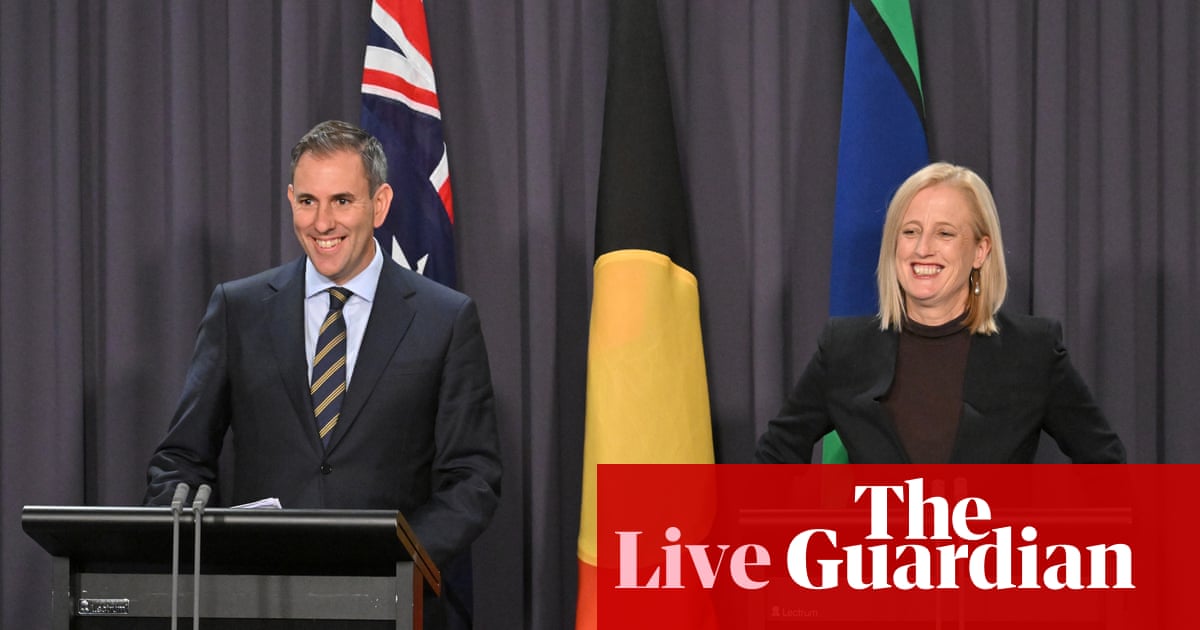Chalmers spruiks budget’s $152bn boost
Paul Karp
The Albanese government has said next Tuesday’s budget will reveal that gross debt is now projected to be $152bn lower in 2023-24 compared with the Coalition’s last budget, down from $1.056tn to $904bn.
Due to lower debt, the government estimates it will save around $80bn in interest costs over the decade to 2032-33, even with an increase in borrowing costs.
Gross debt as a share of GDP is now expected to peak at 35.2%, down from 44.9% in the pre-election fiscal update.
The treasurer, Jim Chalmers, said:
Our government will pay down $152bn worth of Liberal debt this year and save around $80bn on interest payments over the next decade. Debt will peak significantly lower than was projected at the time of the election thanks to our responsible economic management.
These are some of the dividends of our responsible economic management. We’re getting the budget back in better nick, cleaning up the mess we inherited from the Liberals and aiming for the first back-to-back surplus in almost two decades.
Key events
Attorney-general on funding for women’s legal services
Attorney-general Mark Dreyfus is speaking to ABC RN about what measures the government will be implementing to tackle violence against women.
He responded to reports from Women’s Legal Services Australia, who said around 52,000 women were turned away from their services last year. Dreyfus said a review has been done of the current five-year legal assistance partnership between the states and commonwealth, which expires mid next year.
I’m right now considering that review. I’ll have more to say about it soon.
Asked to give more detail, Dreyfus said he was “not going to pre-empt the budget [or] discussions that are ongoing right now … about what the future shape of access to justice looks like in Australia”.
We’ve had years and years of chronic underfunding under the former government. I’ve made some small improvements since we’ve come to office, but it is about major change that’s needed in the sector and that involves discussions between the commonwealth and the states – those are ongoing. I’ve had a review done, we’ll be releasing that review in coming months.
Peter Dutton urges PM to speak to Chinese president directly following alleged flare incident
Opposition leader Peter Dutton says the prime minister needs to “pick the phone up” and speak directly to Chinese president Xi Jinping, after the Australian government accused a Chinese fighter jet of dropping flares close to an Australian helicopter in international waters.
The defence minister Richard Marles yesterday branded the incident as “unacceptable” and said the Australian pilot had to take evasive action to avoid the flares. You can read all the details below:
Speaking on the Today Show, Dutton said:
I think the prime minister needs to pick the phone up, frankly, and speak to the Chinese president … and express our deep concern, because at some stage, there’s going to be a miscalculation and an Australian Defence Force member is going to lose their life.
And that is a tragic circumstance that has to be avoided at all costs, but there will be a miscalculation by somebody who’s flying that jet or somebody who’s on the deck of a Chinese naval ship, something will happen.
And that’s what not just Australia is worried about – the Philippines, Japan, obviously, the United States – many other countries in the region who are very worried about these acts that continue to be provocative and are completely and utterly unnecessary.
$400 bonus for Victorian students in state budget
The Herald Sun has reported that the Victorian state budget will include a new $400 bonus for roughly 700,000 students across the state.
The $287m “School Savings Bonus” will provide one-off payments for every child at a government school and eligible concession card holders at other schools, it reports, with schools to administer the payments later this year.
The Herald Sun reported premier Jacinta Allan as saying:
We’re delivering a Budget that’s helping Victorian families – and the School Saving Bonus sits at the heart of our plan to ease cost-of-living pressures for families right across the state.
We won’t let any child miss out on the things that make Victorian education great, so we’re giving families the flexibility to use the School Saving Bonus on the things they need – from sports to camps, excursions and uniforms.

Elias Visontay
Climate council calls for government to publish vehicle data
The Climate Council is calling on the federal government to publish its own statistics on vehicles imported into Australia, to provide greater transparency when the much-anticipated New Vehicle Efficiency Standard comes into effect.
The council, which has been a vocal proponent of the scheme aimed at disincentivising the use of high-polluting cars and hastening the importation of cleaner vehicles, said the commonwealth should publish the data because the current publisher of the data, the Federal Chamber of Automotive Industries (FCAI) was opposed to the government’s proposed standard. Additionally, the FCAI charges for access to the data.
Through the consultation phase on the vehicle efficiency standard, the FCAI had called for the scheme to be watered down, a position that led to Tesla and Polestar quitting the group in protest. The council said in a statement:
With this industry group having fanatically opposed the New Vehicle Efficiency Standard, these foxes cannot continue guarding the henhouse when the standard comes into effect.
Dr Jennifer Rayner, Climate Council head of policy and advocacy, said:
We want manufacturers to do the right thing and bring in a better range of low and zero emissions cars for Aussies to buy. So we need to know if they keep selling their same old gas guzzlers that are fueling the climate crisis and driving up petrol bills.
The only way for Aussies to keep an eye on what happens with the New Vehicle Efficiency Standard is for the government to publicly release the data it will be collecting through the scheme. We can’t rely on the industry peak body to be upfront and transparent when they threw everything they had into stopping the standard going ahead in the first place.
The federal government will be collecting high-quality data on what cars manufacturers are bringing to Australia and how much pollution every one of them produces. The legislation governing this scheme must ensure this information is reported and released publicly.
The FCAI was contacted for comment.

Natasha May
Half of Australians live with chronic disease but don’t have enough support: AMA
One in two Australians live with a chronic disease, but the peak body for doctors says there is not enough support for managing them – with more investment needed in coordinated multidisciplinary care led by GPs.
Chronic conditions are long lasting conditions with persisting side effects such as arthritis, asthma, cancer, cardiovascular disease, diabetes, chronic kidney disease, mental health conditions and osteoporosis.
As the government prepares a new national strategic framework for chronic conditions, the president of the Australian Medical Association, Prof Steve Robson, says it “must become a priority for all governments in Australia”.
Focusing on management and prevention will benefit patients and the healthcare budget, Robson said:
Chronic conditions are placing an enormous strain on the healthcare system through increased costs and potentially preventable hospital admissions.
In its submission, the AMA is calling for improved arrangements to support GP-led multidisciplinary care.
The submission also highlights the need to address the underlying social determinants of health in contributing to chronic disease as rates of chronic conditions are far higher in Aboriginal and Torres Strait Island peoples, those experiencing socioeconomic disadvantage, people in rural and remote areas and people from culturally and linguistically diverse backgrounds.
Good morning

Emily Wind
And happy Tuesday – thanks to Martin for kicking things off. I’m Emily Wind, and I’ll be with you on the live blog today.
Have any thoughts, questions or tips? You can get in touch via X, @emilywindwrites, or send me an email: [email protected].
Let’s get started.

Daniel Hurst
Intelligence agency defends response to apparent targeting of Australian parliamentarians
The Australian Signals Directorate has defended its response to the apparent targeting of Australian parliamentarians by China-linked hackers in 2021, saying the attempts were unsuccessful.
The Inter-Parliamentary Alliance on China said yesterday that at least six of its Australian members – Liberal politicians James Paterson, Claire Chandler, Alex Antic and Tim Wilson and Labor MPs David Smith and Daniel Mulino – had been targeted by the China-controlled hacking group APT31.
In a post on X yesterday, the parliamentarians said APT31 had “sent a large number of pixel tracking emails to the parliamentary emails of Australian MPs and Senators from a domain masquerading as a news outlet”. The parliamentarians complained that they had not been alerted by Australian security agencies at the time.
A spokesperson for ASD said in a response last night that it “briefs key stakeholders and high office holders on cyber and security matters regularly and as appropriate”.
The spokesperson said Australian security agencies “were advised in 2021 of attempts by malicious actors to spear phish members of the Australian parliament” – a term for the use of highly targeted malicious emails.
The agencies “took appropriate operational action at the time to confirm that the spear phishing was unsuccessful”, the spokesperson said.
Victoria budget to be handed down

Benita Kolovos
The Victorian treasurer, Tim Pallas, will today hand down his 10th budget, which will show the state’s debt is expected to stabilise in the near future.
Guardian Australia understands the budget will see Victoria’s net debt to GSP (gross state product) ratio fall for the first time since 2017.
It is unclear when in the forward estimates this will occur but the 2022-23 budget update, released in December, showed Victoria’s net debt was set to hit $135.5bn by the end of June and will continue to grow to $177.8bn by 2026-27 – or 25% of the state’s economy.
This figure is something Pallas has been keen to bring down as part of his four-step fiscal plan to pay back the state’s debt, which he says a significant amount was accumulated during the pandemic. The final step is “stabilising debt levels”.
The budget will also forecast operating cash surpluses across the forward estimates, reaching $6.1bn in 2027-28.
Unlike previous years, there have been no major pre-budgets announcements unveiled by the government this year, apart from a $95m statewide plan to tackle drug overdoses, after it backflipped on establishing a supervised drug injecting room in Melbourne’s CBD.
The premier, Jacinta Allan, yesterday said her first budget had been “challenging to put together”, citing “pressures” including interest rate rises, inflation and workforce shortages.
These are challenges that we can’t ignore. We simply can’t put our head in the sand and ignore these circumstances as we have been putting this budget together.
It’s why the budget will be firmly focused on Victorian families – as Labor government budgets always are – but we’ll also make the sensible and disciplined decisions that respond to those challenges.
Chalmers spruiks budget’s $152bn boost

Paul Karp
The Albanese government has said next Tuesday’s budget will reveal that gross debt is now projected to be $152bn lower in 2023-24 compared with the Coalition’s last budget, down from $1.056tn to $904bn.
Due to lower debt, the government estimates it will save around $80bn in interest costs over the decade to 2032-33, even with an increase in borrowing costs.
Gross debt as a share of GDP is now expected to peak at 35.2%, down from 44.9% in the pre-election fiscal update.
The treasurer, Jim Chalmers, said:
Our government will pay down $152bn worth of Liberal debt this year and save around $80bn on interest payments over the next decade. Debt will peak significantly lower than was projected at the time of the election thanks to our responsible economic management.
These are some of the dividends of our responsible economic management. We’re getting the budget back in better nick, cleaning up the mess we inherited from the Liberals and aiming for the first back-to-back surplus in almost two decades.
Australian government ‘gravely concerned’ by prospect of Israeli ground offensive into Rafah
The Australian government has said it is “gravely concerned by the prospect of a major Israeli ground offensive into Rafah” following the issuing of evacuation orders in parts of Gaza’s southernmost city.
A spokesperson for the Australian foreign affairs minister, Penny Wong, said in a statement issued last night:
More than half of Gaza’s 2.3 million population has sought shelter in Rafah, from the fighting elsewhere.
Australia, the G7 and so many countries have called on the Netanyahu government to change course. The foreign minister has made clear Australia’s view that Israel should not go down this path.
The language is similar to what the Australian government has been saying since February, when Wong warned of “deep” concerns about a Rafah ground offensive and urged Israel to “listen to its friends”. In March, Wong said Israel would continue to lose support from the international community unless it “changes its course”.
Welcome

Martin Farrer
Good morning and welcome to our live news coverage. I’m Martin Farrer and here are some of the top overnight lines you need to know about before Emily Wind takes up the strain.
Hopes that a ceasefire in the Israel-Gaza war could avert a full-scale Israeli assault on Rafah are in the balance this morning after a night of knife-edge diplomacy and threats. The Australian government has said it is “gravely concerned by the prospect of a major Israeli ground offensive into Rafah” following the issuing of evacuation orders in parts of Gaza’s southernmost city. It’s a tough test for the Albanese government which may soon have to decide where it officially stands on Palestinian statehood when the UN votes on the issue at the end of the week. More coming up.
Voters have indicated strong backing for government intervention to counter online harm, including enforcing age verification for pornography, gambling and social media, according to our latest Essential poll. It found majority support for a range reforms to improve online safety including: making it illegal to post sexualised “deepfake” images (80% support); enforcing age verifications for pornography and gambling sites (79%); enforcing age verification for social media (76%); and increasing the “capacity for law enforcement to scrutinise online behaviour” (75%).
The Albanese government has said next Tuesday’s budget will reveal that gross debt is now projected to be $152bn lower in 2023-24 compared with the Coalition’s last budget, down from $1.056tn to $904bn. The treasurer, Jim Chalmers, said the improvement was down to the government’s good management of the economy and that Labor was getting the budget into “better nick”.
There are still stern economic tests for the government, however, none more so than the cost of living. All eyes will be on the Reserve Bank’s statement about interest rates at 2.30pm in the hope of at least some signs of lower borrowing costs. More coming up.
An extensive study into the economics of the professional performing and visual artists and writers reveals today that women working in the sector outnumber men two to one. The ratio in the literary world is even more pronounced in favour of women with 83% of authors being women, according to the work by Creative Australia. However, the sting in the tail is that despite the numerical difference, the numbers still don’t add up to equal pay with women earning 19% less than their male colleagues.

